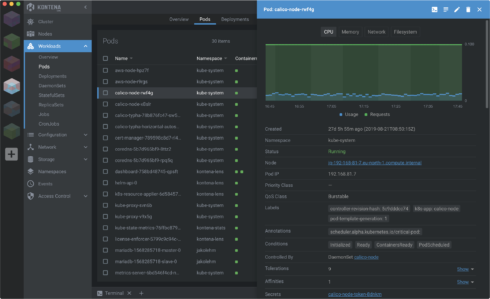
This week’s highlighted open-source project is Lens, which is an IDE for Kubernetes. It can be used to handle operations, monitoring, development, and debugging in Kubernetes environments.
“Lens provides the full situational awareness for everything that runs in Kubernetes. It’s lowering the barrier of entry for people just getting started and radically improving productivity for people with more experience,” the project’s website states
It helps with multi-cluster management by providing a single IDE for interacting with all clusters. According to the project team, it is easy to switch between clusters to work on as well.
It also offers multiple workspaces that can be accessed from a single point, and easily switchable. The team explained workspaces are used to organize clusters into groups, and are useful for teams that need to deal with multiple clusters.
To help with monitoring, the dashboard includes graphs and resource utilization charts. Lens comes pre-built with a multi-tenant Prometheus setup. Users will be able to see visualizations for each namespace and resource that they have access to. “All graphs and resource utilization charts are designed to be very accessible and available in the right context no matter which part of the dashboard you are operating,” according to the project website.
The terminal is context-aware, meaning that it ensures that the version of the Kubernetes cluster API is compatible with the version of kubectl that is in use. If not, it will download and assign the correct version automatically.
It also provides management capabilities for Helm Charts, such as browse and search functionality, one click deploy, configuration settings with help, the ability to explore installed Helm charts, and single click upgrades.
Recently in Lens 4.0, Lens Extensions were introduced. This is a new feature that enables extension developers to plug-in directly to the Lens UI, add functionality, and integrate with technologies around Kubernetes.
Lens is available as a standalone application for MacOS, Windows, and Linux. It currently has over 1.3 million downloads, almost 100,000 users, and 10,000 GitHub stars.








